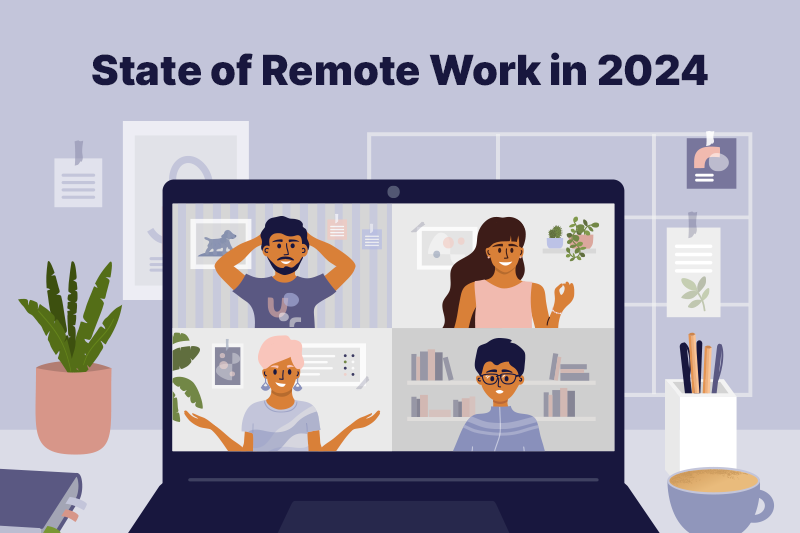The State of Remote Work in 2024 & Beyond: 10 Transformative Trends for HR Professionals

In the realm of HR, where innovation and adaptability are the cornerstones of success, the very fabric of work is undergoing profound change. 2024 isn't just another year; it's the fulcrum upon which the traditional concepts of work are being reinvented. The state of remote work, once regarded as a mere workplace alternative, has now become a driving force shaping the way organizations operate.
It’s not surprising that the 2023 State of Remote Work report by Buffer highlights that 82% of remote workers are working from home. The same report also points out that 71% of companies are permanently allowing some amount of remote work.
In the face of this, it's crucial for HRs professionals to understand how the dynamics of remote work are shifting and how they must be poised to navigate these uncharted waters. Therefore we delve deep into the compelling trends shaping the state of remote work in 2024 to unveil how HR professionals will play a pivotal role in steering organizations towards the future.
Benefits of Remote/Hybrid Working
- Enhanced Work-Life Balance - Working remotely can help employees balance their professional and personal lives more effectively. This can lead to higher job satisfaction and increased productivity.
- Increased Productivity - Many employees report higher productivity levels when working from home. A recent study by Global Workplace Analytics reports that 35-40% of remote employees feel more productive when working fully remotely. Reduced commute times and the ability to create a personalized work environment contribute to this.
- Cost Savings - Employees can save money on commuting, work attire, and daily lunches. According to Zapier’s The Future of Remote Work Report, remote work has improved savings for 61% of their respondents. This adds up to significant cost savings over time.
- Access to a Global Talent Pool - Remote work opens the doors to a global talent pool. Recruiters can tap into talent from anywhere in the world, bringing diverse perspectives and skill sets to the team.
- Reduced Office Overheads - For businesses, remote work can translate into reduced office space needs and associated expenses.
“People are more productive working at home than people would have expected. Some people thought that everything was just going to fall apart, and it hasn’t. And a lot of people are actually saying that they’re more productive now.” - Mark Zuckerberg, CEO of Facebook
Struggles in Remote Work
While the benefits of remote work are substantial, it's not without its challenges. HRs and recruiters need to be aware of these hurdles:
- Isolation and Loneliness - Some employees may feel isolated and disconnected from their team when working remotely.
- Work-Life Boundaries - A Remote.co survey says that 40% remote employees find unplugging after work hours to be the biggest challenge in their working lives. Balancing work and personal life can be challenging for some, as remote work often blurs these boundaries.
- Communication Barriers - Effective communication can become a challenge, leading to misunderstandings or misalignment on tasks and projects.
- Technology Issues - Technical glitches, internet connectivity problems, or hardware issues can disrupt work. 80% of employees reported that they have lost meeting time due to tech difficulties; says the State of Hybrid Work 2023 report by Owl Labs.

Top Trends Predicted for Remote/Hybrid Work in 2024
As we look ahead to 2024, the remote work landscape is set to evolve further. Here are the top trends predicted for remote/hybrid work:
Revised Outlook towards Hybrid Work Models
In 2024, the traditional 9-to-5 office routine is all set to become a relic of the past. Hybrid work models will gain further ground, acknowledging the diversity of work styles and the need for flexibility. In coming times, HR professionals will work closely with leadership to establish clear guidelines for hybrid work. This includes defining which roles can be performed remotely, creating schedules that accommodate both remote and in-office work, and ensuring that the technology & infrastructure are in place to support this new way of working.
Expansion by Hiring Geographically Diverse Workforce
2024 will also mark the era of truly global talent acquisition. With remote work as the norm, HR professionals will focus on tapping into a vast international talent pool. This trend reshapes recruitment strategies, allowing companies to access diverse skill sets & cultural perspectives. Recruiters will be looking to adapt for hiring candidates from different time zones, languages, and cultural backgrounds. Recruiters can also switch to apna.co to fulfill their hiring requirements owing to its far-reaching presence & seamless accessibility.
HR Processes will be Further Automated
Though currently HR professionals are no longer buried under mountains of paperwork, 2024 will be the year of further automation. Automation will continue to evolve, incorporating artificial intelligence (AI) and machine learning to make data-driven decisions in recruitment and talent management. This will help HRs save time and streamline recruitment, onboarding, performance management, and other processes. But it will also require some upskilling on the HRs’ part as they strive to become proficient in using these tools to ensure a competitive edge in hiring and retaining top talent.
Advent of More Freelancers
The coming years will see a shift as companies increasingly turn to freelancers for specialized tasks and projects. According to a report by Upwork, 58% of professionals who are not currently freelancing said they were considering it in the future. As freelancing booms in 2024, businesses will have the flexibility to access niche expertise whenever required. This means that HR professionals will focus more on creating talent pools of freelancers and establishing clear guidelines for collaboration. Effective project management, contractual agreements, and seamless integration of freelancers into the team will remain essential for success.

Increased Priority on Employee Wellness Initiatives
Owl Labs’s The State of Remote Work 2022 report shows that 45% workers reported an increase in their work stress levels while working remotely. As remote work blurs the boundaries between personal & professional life, organizations will be taking steps to support their employees' well-being. It’s the HR professionals who will play a pivotal role in implementing wellness programs, offering mental health support, and addressing issues related to remote work-related burnout. This will include creating policies encouraging employees to disconnect after work hours, providing resources for stress management, and fostering a culture of well-being.
Increased Importance to Data Security & Privacy
With the increase in remote work, threats to data security and privacy have multiplied. According to OpenVPN’s Remote Workforce Cybersecurity Survey, 90% company executives believe that remote workers aren’t secure. As 2024 rolls over, more companies will be investing in robust cybersecurity measures to protect sensitive information from breaches & cyberattacks. Here the role of HR professionals will be important as they’ll be responsible for enforcing and communicating these security policies to remote employees, ensuring compliance with data protection regulations, and providing training to minimize security risks associated with remote work.
More Emphasis on Virtual Interviews
2024 will bring further innovative changes to the recruitment process. Virtual interviews, powered by AI and augmented reality, will become the norm. A recent survey found that 93% of the companies that adopted virtual interviewing expect to continue the practice in the future. These technologies will offer a more immersive and interactive candidate experience, helping recruiters assess them more effectively. Therefore, in 2024 & beyond, HR professionals will need to adapt to these technologies and understand how to use AI-driven interview tools, virtual reality platforms, and other innovations to attract, evaluate, & hire top talent.
Maximised Investment in Continuous Upskilling
In 2024’s rapidly evolving job market, employees themselves will take initiatives for continuous learning and development. They’ll be investing more in upskilling and reskilling to maintain their competitive edge. Here HR professionals will also be key by providing them with access to online learning platforms, virtual training, and personalized development plans. The role of managers will also be crucial in identifying skill gaps, designing relevant training programs, and tracking progress.
Renewed Interest in Digital Nomadism
In 2024, more employees will again be choosing to work from diverse locations globally, and HR professionals will have to adapt to support remote work from anywhere. This trend will challenge HR teams to develop policies and strategies that accommodate employees who embrace a location-independent lifestyle. Balancing the needs of the organization, compliance with tax & legal requirements in different regions, and employee expectations for flexibility is going to become an ongoing challenge.
Gen Zers will Take Remote Work Further
As Gen Z enters the workforce, they bring with them a tech-savvy and remote-friendly mindset. According to Deloitte’s survey, 75% Gen Zs would prefer a hybrid or remote work arrangement. HR professionals need to cater to their expectations, which include flexible work arrangements, digital tools, and a strong emphasis on social & environmental responsibility. Therefore, in 2024, Gen Z is poised to take remote work further by pushing the boundaries of what's possible in the remote work landscape, and HR professionals will need to adapt to their preferences and values.

2024 will mark a turning point for remote work, with HR professionals playing a central role in navigating these transformative trends. A popular research report predicts that the future of the hybrid work model is expected to increase from 42% in 2021 to 81% in 2024. As the world of work continues to evolve, it is vital for HR professionals to adapt to these changes, meet the needs of employees, and stay ahead of the trends to attract and retain top talent in 2024 and beyond.
apna app has 5 Cr+ verified candidates and is trusted by 4 lakh+ companies. Recruiters can easily find the right candidate on apna portal amongst 75+ job categories like telesales, marketing, business development, accounts & finance and many more.

Start hiring on apna.co right now!



